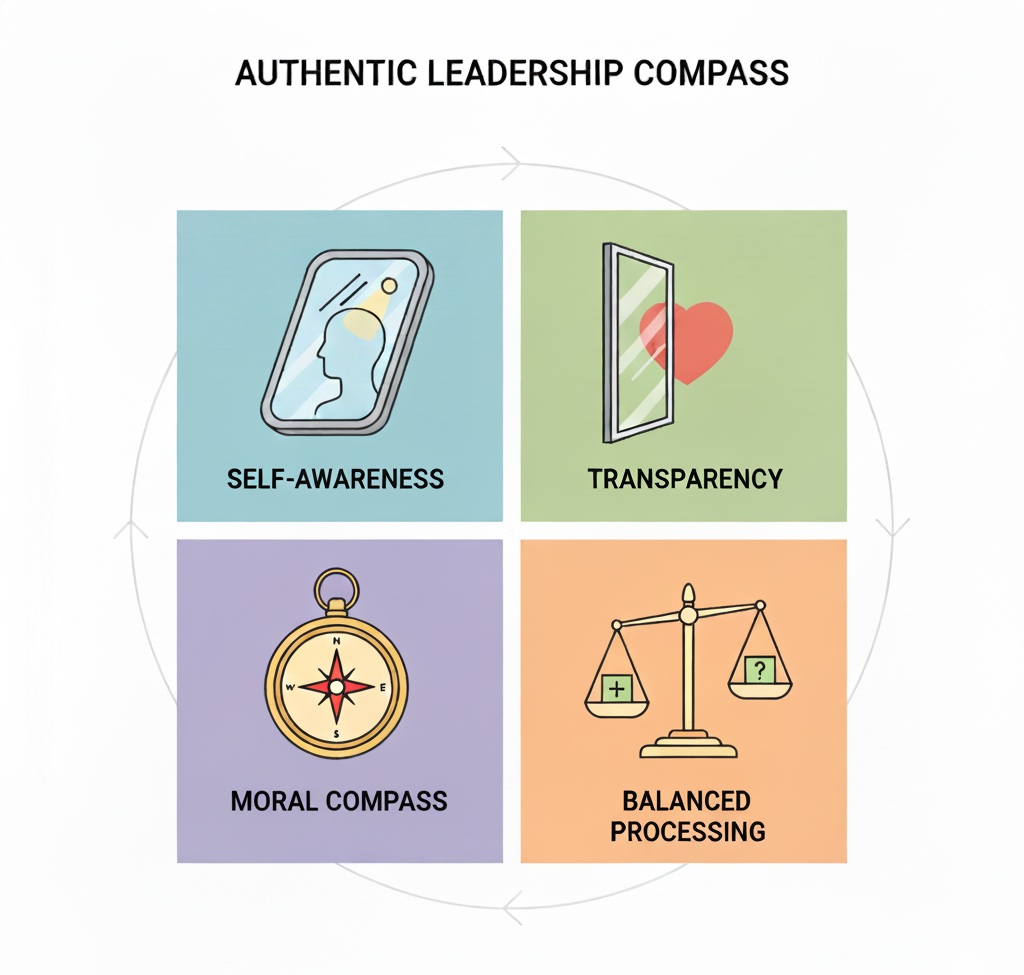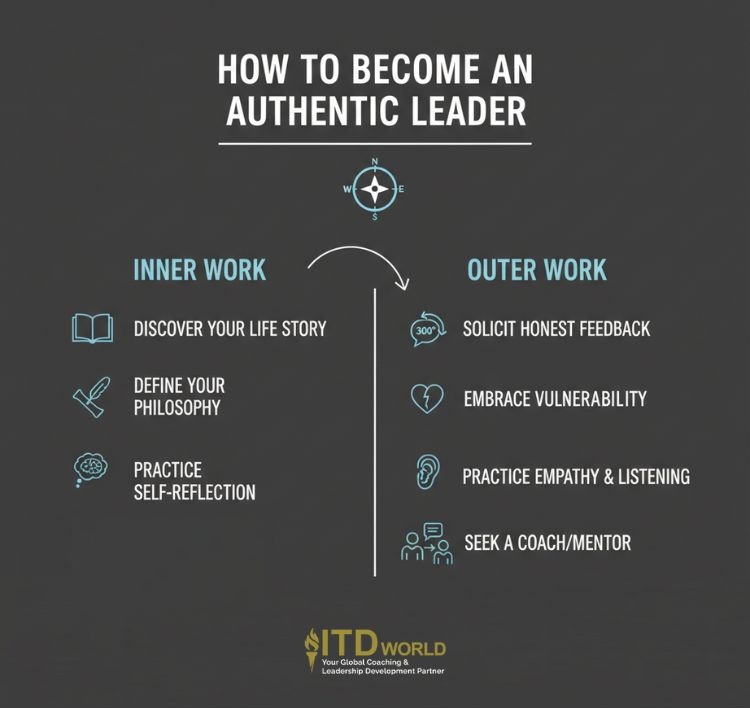A practical guide to authentic leadership, including key components and detailed steps for adopting this powerful management approach.
The business landscape has been changing dramatically for the last few decades. In today’s world – characterized by constant disruptions, uncertainties, and widespread skepticism – employees are no longer inspired by polished corporate personas; they are looking for leaders who are real, consistent, and human. Given that reality, what is the fastest and most sustainable path to earning a team’s trust and commitment? The answer, as it turns out, lies in the practice of authentic leadership.
|
Author: Jonathan M. Pham |
Highlights
- Authentic leadership is a practice where a leader is transparent, self-aware, and consistently acts in alignment with their genuine character, core values, and personal beliefs. It is a strategic necessity that rebuilds trust in a skeptical world, inspires commitment from younger generations, and ultimately drives higher employee engagement and performance.
- The four key components of authentic leadership involve self-awareness (knowing oneself deeply), relational transparency (openly sharing thoughts and feelings), balanced processing (objectively considering all viewpoints), and an internalized moral perspective (acting consistently based on a strong ethical compass).
- Leading with authenticity is a continuous journey that requires inner work (discovering your life story, defining a personal philosophy, and self-reflection) and outer work (soliciting honest feedback, embracing vulnerability, practicing empathy, and seeking a coach).
- The key challenges of authentic leadership include the risk of misinterpreting it as a license for unskillful, rigid behavior (“Authenticity vs. Adaptability” dilemma), the pitfall of self-deception regarding one’s true impact, and the fear of vulnerability in a corporate environment.
What is Authentic Leadership?
Authentic leadership is a leadership approach where one leads from their own genuine character, core values, and personal beliefs. It is the practice of being transparent, self-aware, and demonstrating a consistent alignment between one’s words and actions.
Crucially, it is not about achieving a state of perfection, but about a commitment to being real. An authentic leader doesn’t have a separate “work persona”; they bring their whole self to their leadership role, including their strengths, weaknesses, and unique life experiences.
Example: An authentic leader who values team well-being doesn’t just talk about the importance of work-life balance; they are seen leaving the office at a reasonable hour to attend their child’s school event. Their actions are a direct and observable reflection of their stated values.

History of the Authentic Leadership Theory
While the term is modern, its philosophical roots can be traced back to the ancient Greek maxim inscribed at the Temple of Apollo at Delphi: “Know thyself” – which speaks to the importance of self-awareness as the foundation of success in life.
In the 21st century, the concept was popularized and brought into the business mainstream by leadership expert and former Medtronic CEO, Bill George. He argued that the most effective leaders do not try to imitate others. Instead, they learn to lead from their own unique life story, values, and “True North.” His work shifted the focus from trying to be a “perfect” leader to having the courage to be a genuine one.
The reality is that no one can be authentic by trying to be like someone else. There is no doubt you can learn from their experiences, but there is no way you can be successful trying to be like them. People trust you when you are genuine and authentic, not an imitation.
Bill George

Authentic leadership style
Benefits of Authentic Leadership
As mentioned, leading with authenticity is not just a moral preference; it is a strategic necessity in today’s complex and uncertain landscape. It directly addresses the core needs of the modern workforce and creates a powerful, sustainable competitive advantage.
- Rebuilds trust in a skeptical world
In an era of widespread misinformation, employees and customers are highly attuned to inauthenticity; as such, trust becomes non-negotiable for long-term success. As found out by The Edelman Trust Barometer, employees’ trust in their employer is deeply linked to their perception of leaders as being ethical, honest, and transparent. Authentic leaders who “walk their talk” are the primary drivers behind that.
- Inspires commitment from younger workers
Modern workforces, particularly Gen Z and Millennials, are not motivated by positional power alone. Rather, they are inspired by leaders they can genuinely connect with and respect. As demonstrated in Deloitte’s annual Gen Z and Millennial Survey, these generations prioritize working for those whose personal values align with their own – and who is able to demonstrate authenticity in everything they do.
- Drives engagement & performance
Research has repeatedly shown a strong correlation between authentic leadership and higher levels of employee engagement, job satisfaction, and overall team productivity. When leaders are real, their people feel safe to bring their best, most creative selves to their work.

Authentic Leaders in History
- Nelson Mandela: His global credibility was rooted in his unwavering authenticity. After 27 years of imprisonment, he led South Africa’s transition from apartheid with a consistent message of forgiveness and reconciliation that was perfectly aligned with his personal values. His actions matched his words, building trust on a national and global scale.
- Oprah Winfrey: She built a global media empire on a foundation of radical transparency. By openly and consistently sharing her own struggles, values, and journey of self-discovery, she cultivated a powerful, genuine connection with her audience and her team, proving that realness can be immense sources of influence and success.
4 Key Components of Authentic Leadership
Authentic leadership is far from being a vague feeling of “being yourself”. It is a research-backed framework made up of four distinct and measurable components that, when practiced together, create a powerful and trusted leadership presence.
-
Self-awareness
Self-awareness involves a deep and honest understanding of one’s core values, passions, strengths, and, just as importantly, their own weaknesses and blind spots. It is the ability to see oneself clearly, which is the absolute prerequisite for allowing others to see the real you. Without this foundational self-knowledge, a leader cannot be genuinely authentic – simply because they don’t truly know the “self” they are being true to.
-
Relational transparency
Authenticity requires leaders to openly and appropriately talk about their thoughts, feelings, and beliefs with the team. In doing so, they help close the gap between their inner reality and outer persona, thereby letting people see the real person behind the title.
You don’t have to share every unfiltered thought though. What it means is to have the courage to say, “I’m feeling concerned about this upcoming deadline, and I need your help,” or “I am genuinely excited about the new direction this project is taking.” Vulnerability makes one more relatable and human.
-
Balanced processing
As a leader, one needs to remind themselves about the importance of seeking out and objectively considering all relevant data and diverse viewpoints – especially those that challenge their own – before acting. Doing so demonstrates that one is more committed to finding the best possible answer than to being right.
Example: An authentic leader practicing balanced processing doesn’t just listen to their supporters. Before coming up with a major decision, they will intentionally reach out to the most thoughtful skeptic on their team and ask, “What am I not seeing here? What are the potential flaws in this plan?”
-
Internalized moral perspective
An internalized moral perspective means one is guided by a strong, internal set of values and ethical standards, rather than being swayed by external pressures from the organization, society, or peers. It is what gives an authentic leader consistency and integrity, as their actions are guided by a stable inner compass.
This is also where authentic leadership connects with other people-centric philosophies. For example, when an authentic leader’s internal moral perspective is primarily focused on the growth and well-being of others, their style will naturally manifest as Servant Leadership.

Bill George’s authentic leadership model: 4 key characteristics
How to Become an Authentic Leader
Authentic leadership is not a destination to arrive at, but a continuous journey of self-discovery, practice, and commitment. It requires both the deep “inner work” of understanding oneself and the courageous “outer work” of bringing that true self into one’s interactions with others.
The inner work: Laying the foundation
- Discover your life story
Take time to reflect on key “crucible” moments in your life and career. What challenges have shaped you? What did you learn from your greatest successes and failures? Understanding your personal narrative is key to understanding your authentic self.
- Define your leadership philosophy
Translate your values into a clear, personal leadership philosophy. This document serves as your “True North,” providing a consistent anchor for every decision and action, ensuring they are rooted in what you truly believe.
- Practice self-reflection
A regular habit of introspection serves as the primary method for cultivating the crucial leadership skill of emotional intelligence. Practices like journaling or mindfulness allow you to observe your own thoughts and feelings without judgment, which is the first step toward managing your reactions and understanding the motivation behind them.

The outer work: Putting authenticity into practice
You cannot acquire a complete picture of your real self without knowing how others perceive you. Aside from using formal tools like 360-degree feedback to get structured, multi-source input, feel free to occasionally reach out and ask trusted colleagues direct questions like, “What is one thing I could do to be a more effective leader for you?”
- Embrace vulnerability
Authenticity requires the courage to be imperfect. This practice, as noted by Dr. Brené Brown, is not a weakness; it is the fastest path to cultivating genuine trust and connection.
Example: Start small by admitting in a team meeting, “I don’t have the answer to that right now, but it’s a great question and I will find out.” A simple act of vulnerability, yet it is enough to make you much more human and relatable.
Read more: Humble Leadership – The Quiet, Often Forgotten Powerhouse
- Practice empathy & deep listening
These two are non-negotiable authentic leadership skills. In every interaction, do your best to give people your full attention, ask clarifying questions, and try to understand their perspective without immediately imposing your own.
Read more: Compassionate Leadership – Beyond Simply ‘Being Nice’
This journey is difficult to walk alone. A trusted coach or mentor provides an invaluable objective mirror. They can help you process feedback, challenge your assumptions, and hold you accountable to leading from a place of genuine authenticity.

Authentic leadership development
Authentic servant leadership
Challenges & Criticisms of Authentic Leadership
- The “Authenticity vs. Adaptability” dilemma
This is the most common and valid criticism of the style. A leader might say something like “I’m just being authentic” as an excuse for rigid, unskilled, or even abrasive behavior. In this case, authenticity is, unfortunately, misinterpreted as a license to be a “jerk” or to refuse to adapt one’s approach to different people and situations.
Solution: Be skillful. True authentic leadership is not about an unfiltered display of every thought and emotion. What’s important is to be true to your core values – while also adapting your behavior to be effective in a given context.
Example: An authentic leader whose natural style is very direct and fast-paced learns that a new team member responds better to a more patient and collaborative approach. They do not change their core value of “honesty,” but they adapt their communication style to better suit that person, demonstrating both integrity and empathy.

- The risk of self-deception
As research by organizational psychologist Tasha Eurich shows, many leaders believe they are highly self-aware when, in fact, their self-perception does not match how others see them. Some may believe they are an empowering manager, and yet in reality, their team members think of them as a micromanager. In other words, they are “authentically” unaware of their negative impact on the team.
Solution: Commit to external feedback. The only way to guard against self-deception is to test one’s internal self-perception against external reality. This requires an unwavering commitment to seeking and listening to others’ input.
- The fear of vulnerability
The practice of relational transparency – admitting mistakes, sharing appropriate feelings, saying “I don’t know” – may feel incredibly risky in a competitive corporate environment where leaders are expected to appear perfect and infallible.
Solution: Reframe vulnerability as the path to trust. When a leader demonstrates the courage to be vulnerable, they don’t lose respect. Instead, they create a human connection and give their team permission to be open too, which is the foundation of a psychologically safe and high-performing culture.
| Aspect | Pros |
Cons
|
| Trust | Builds trust through honesty and transparency |
Fear of vulnerability
|
| Engagement | Drives engagement & performance as employees feel safe to bring their creative best to work |
Risk of self-Deception, where leaders are “authentically” unaware of their negative impact
|
| Talent | Inspires commitment from younger workers |
Authenticity vs. Adaptability dilemma – misinterpreting authenticity as a license for rigid, abrasive behavior without adapting to context.
|
Authentic leadership pros & cons
Sample Authentic Leadership Self-assessment Questionnaire
This questionnaire is a tool for personal reflection, designed to provide a snapshot of your authentic leadership practices based on the four-component model. There are no right or wrong answers. The goal is to honestly assess your current behaviors to identify your strengths and key opportunities for growth.
Instructions:
For each statement, rate yourself on a scale of 1 to 5 based on how consistently you demonstrate the behavior in your leadership role.
Rating Scale:
1 = Rarely / Never
2 = Occasionally
3 = Sometimes
4 = Frequently
5 = Almost Always / A Core Strength
Section 1: Self-Awareness (Knowing Thyself)
| Statement | Rating |
| 1. I have a clear understanding of my core values and what I stand for as a leader. | 1 2 3 4 5 |
| 2. I can accurately identify my greatest strengths and my most significant weaknesses. | 1 2 3 4 5 |
| 3. I am aware of how my mood and emotions impact the energy of my team. | 1 2 3 4 5 |
| Subtotal: | / 15 |
Section 2: Relational Transparency (Being Real)
| Statement | Rating |
| 1. I am willing to admit my mistakes to my team without becoming defensive. | 1 2 3 4 5 |
| 2. I openly share my thoughts and feelings in a way that is appropriate for the workplace. | 1 2 3 4 5 |
| 3. My team would describe me as genuine and “the same person” in public and in private. | 1 2 3 4 5 |
| Subtotal: | / 15 |
Section 3: Balanced Processing (Thinking Fairly)
| Statement | Rating |
| 1. I actively seek out opinions and perspectives that are different from my own before making a decision. | 1 2 3 4 5 |
| 2. I listen to critical feedback without immediately trying to justify my original position. | 1 2 3 4 5 |
| 3. I make decisions based on all available data and input, not just on my own biases. | 1 2 3 4 5 |
| Subtotal: | / 15 |
Section 4: Internalized Moral Perspective (Your Inner Compass)
| Statement | Rating |
| 1. I stick to my core values and ethical principles, even when it is difficult or unpopular. | 1 2 3 4 5 |
| 2. My decisions are guided more by my internal sense of right and wrong than by external pressures. | 1 2 3 4 5 |
| 3. My team trusts that I will consistently do the right thing. | 1 2 3 4 5 |
| Subtotal: | / 15 |
Reflection and Next Steps:
- My Greatest Strength: Look at your highest-scoring section. What does this tell you about your core strength as an authentic leader?
- My Biggest Opportunity for Growth: Look at your lowest-scoring section. What is one specific action you can take this month to improve in this area?

Authentic Leadership Quotes
Your life story defines your leadership.
Bill George
Leadership is a journey, not a destination. It is a marathon, not a sprint. It is a process, not an outcome. (quoting John Donahoe)
Bill George
Leadership is not about being perfect. It’s about being authentic.
Simon Sinek
Becoming a leader is synonymous with becoming yourself. It is precisely that simple and it is also that difficult.
Warren Bennis
The supreme quality of leadership is integrity.
Dwight D. Eisenhower
Authentic Leadership Books
- Authentic Leadership by Bill George
A foundational work that defines the basics of the theory – plus the importance of values, purpose, and self-awareness as one adopts this style.
- True North by Bill George & Peter Sims
Based on interviews with 125 leaders, the book offers a roadmap for discovering your authentic leadership style.
- Dare to Lead by Brené Brown
Discusses vulnerability, courage, and empathy as core traits of authentic leaders.
- Leaders Eat Last by Simon Sinek
Explores how leaders inspire trust and loyalty by prioritizing the needs of their teams.
- Integrity by Dr. Henry Cloud
Examines how character shapes leadership and success, with practical advice on building trust and finishing well.
- Start with Why by Simon Sinek
Encourages leaders to lead with purpose and clarity, helping others understand the “why” behind their actions.

How ITD World Can Help with Authentic Leadership Development
ITD World’s training programs are designed to foster the deep self-awareness and emotional courage required to lead with genuine authenticity.
- Executive coaching: Our one-on-one coaching sessions provide a confidential space for leaders to reflect on their life story, clarify their core values, and process feedback to cultivate both internal and external self-awareness.
- Leadership workshops: ITD World’s targeted programs, which revolve around competencies like Self-Awareness, Emotional Intelligence, etc., are meant to equip participants with the foundational tools for leading with greater impact.
- Customized in-house programs: We partner with organizations to build a culture of trust and psychological safety where authentic leadership can thrive at all levels, tailoring solutions to your unique needs.
Ready to lead with integrity and confidence? Contact ITD World today to learn how our solutions can support your journey!
Other resources you might be interested in:
- Transformational Leadership: Inspiring Change & Growth
- Spiritual Leadership: A Remedy for Today’s Workplace Woes
- Love Leadership: More Than an Abstract Philosophical Idea
- 9 Key Leadership Skills for the Future of Work
- Leading by Example: Key to Truly Inspiring Action & Trust

